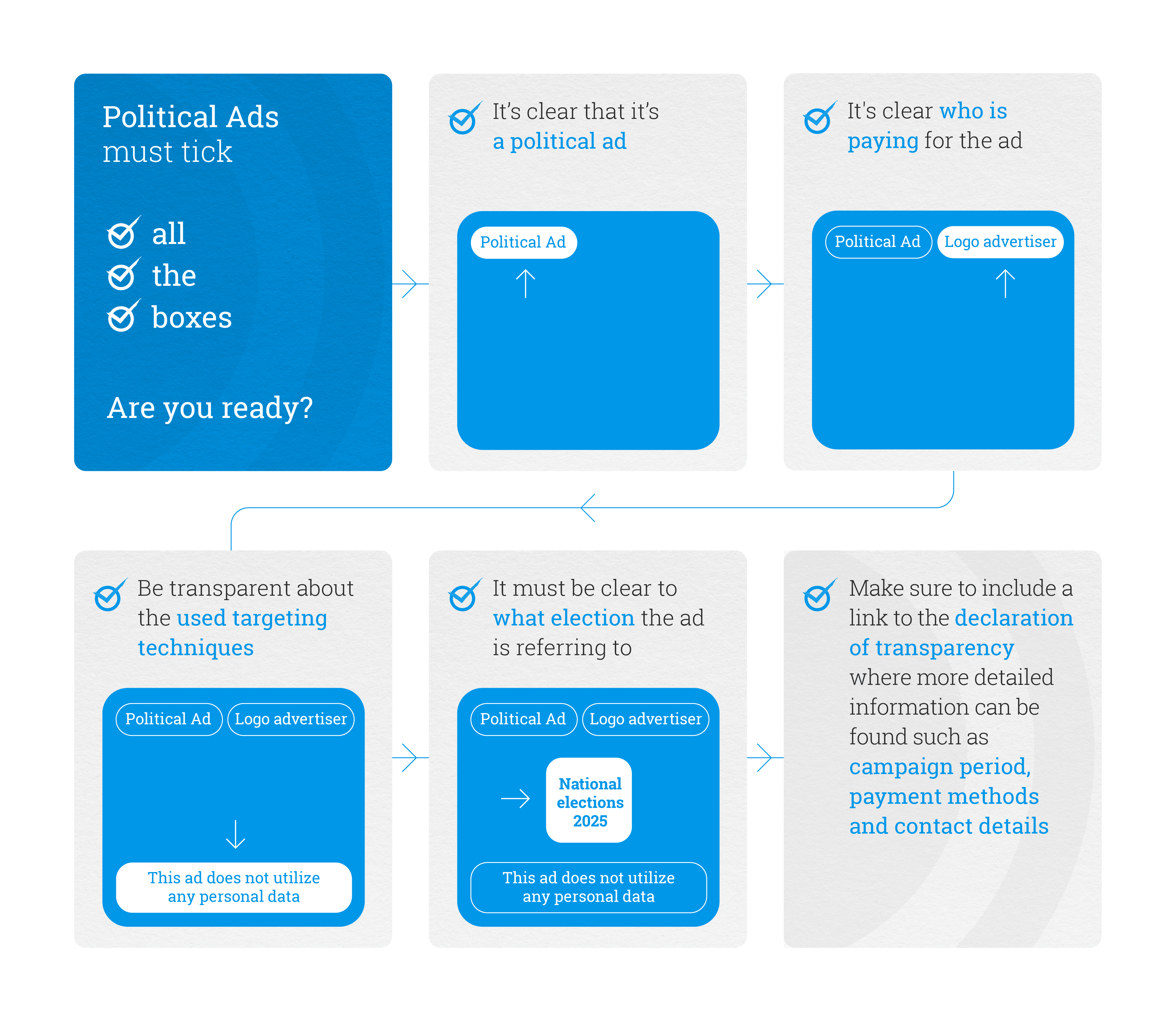A clear overview of the new laws and how to comply
Currently, ad-delivery techniques that are widely being implemented to execute ad campaigns, use personal data to determine whether or not a person should be in- or excluded from the targeted audience. It involves the frequent use of algorithms that are opaque to the majority of people in the EU, and of which the effects are often unknown.
This way of targeting results in a high risk of misuse of personal data, which threatens transparency in the electoral process and fundamental rights (such as privacy, equality and freedom of expression) as well as the right to be informed in an objective, transparent and pluralistic manner.
The new EU-regulation will make it easier for individuals to identify political advertisements as such, comprehend its origins and identify the sender. They will also be able to see whether or not they were directly targeted using personal data. The aim is to provide full transparency and prevent information manipulation and interference by third-country actors in national elections.
The new EU-regulation in a nutshell
So, what does the new EU-regulation entail? If you’d like to read the full legal outline, you can review it
here. However, in this article we’ll summarize it, and explain what the new regulation means for political parties (the advertisers in this context) as well as for publishers that display political ads.
Advertisers
The most important change following the new EU-regulation is that political advertisements must be accompanied by a
transparency labelthat is easily accessible to all viewers.
It must be clear:
- that the message is a political advertisement;
- which organisation is the sender/advertiser (who pays for the ad?) - including their contact details;
- where a declaration of transparency can be found (containing more extensive information about a.o. the funding of the ad, campaign period and an explanation of the used targeting techniques);
and, where applicable:
- what election or referendum the ad is referring to - such as a national election, municipal elections. etc.;
- a statement whether the ad has been subject to targeting or ad-delivery techniques.
This means that a political advertiser needs to provide all required information and a transparency notice to all parties executing their advertisement campaigns and/or running their ads.
On top of that, targeted political advertisement is only permitted under stern conditions.
Any personal data used to target individuals must be collected from that person themselves and may only be used if the individual has given explicit consent for its use in political advertising. Targeting based on sensitive information such as political views, religion or ethnicity, is strictly forbidden and needs to be prevented at all costs.

*Image is based on the explanation done by the European Commision
Publishers
First of all, for publishers this means that they are obliged to facilitate the transparency-layer for all political ads on their platform. This means they need to evaluate their advertisement policies and identify whether they display political ads. If that is indeed the case, they will be
obliged to provide full transparency on the abovementioned list of requirements.
Publishers are obliged to enable viewers of political advertisements to submit a notification in case an ad does not seem to meet the new EU-regulation. And, in order to prevent foreign interference, providing advertising services to senders/sponsors from third countries is forbidden in the three months prior to an election or referendum.
For some publishers,
Meta, for example, the new regulation has led to the decision to stop showing political advertisements overall. The company behind Facebook, Instagram and WhatsApp has announced that the new regulation makes it ‘unworkable’ to display political ads in the European Union.
Google, too, has decided to halt political advertisements before the regulation enters into force in October, and Xandr (by Microsoft) has already adopted a global policy to refrain from political advertisements on their platform.
How to ensure compliance
Despite these tech giants backing out completely, it’s still possible to display political ads - as long as both advertisers and publishers take the correct measures to meet the requirements to comply with new EU-regulation. For instance, it’s possible to run an ad campaign using targeting based on context rather than personal data. Targeting can be contextual, based on the content the user is reading.
In the Netherlands, Opt Out Advertising has the tools to facilitate advertisement without the use of personal data with publishers such as Regionale Publieke Omroepen, NRC, Financieel Dagblad and DPG.
For
political parties and organisationsthat want to run a political ad campaign, it’s essential to keep track of all information about their ads in order to make them transparent, and then provide the required data to the publisher they chose to collaborate with. It’s important to be extra cautious about targeting techniques and which data is used in order to determine the targeted audience.
If incorrect use of personal data is detected for your advertisements - whether this is about how the data is collected or the nature of the data itself - advertisers and publishers are at risk of being fined. This means that political advertisers need to find a partner that is dedicated to meet the requirements for EU-regulations and facilitates this in a manner that complies with every aspect of the new law.
have to be mindful about which political ads they put on their platform and make sure these all meet the new laws - in collaboration with the political organisations. Additionally, they must facilitate the tech that is required to put the transparency layer on political ads - either internally or through an external partner in charge of their advertising strategies. They also have to strictly monitor their ways of targeting and ensure any (personal) data used is collected and used appropriately.
Are you part of a political organisation that (potentially) wants to run an advertisement campaign? Or do you work for a publisher that displays political ads and do you need technical or legal help to comply with the new EU-regulation? Don’t hesitate to reach out!




